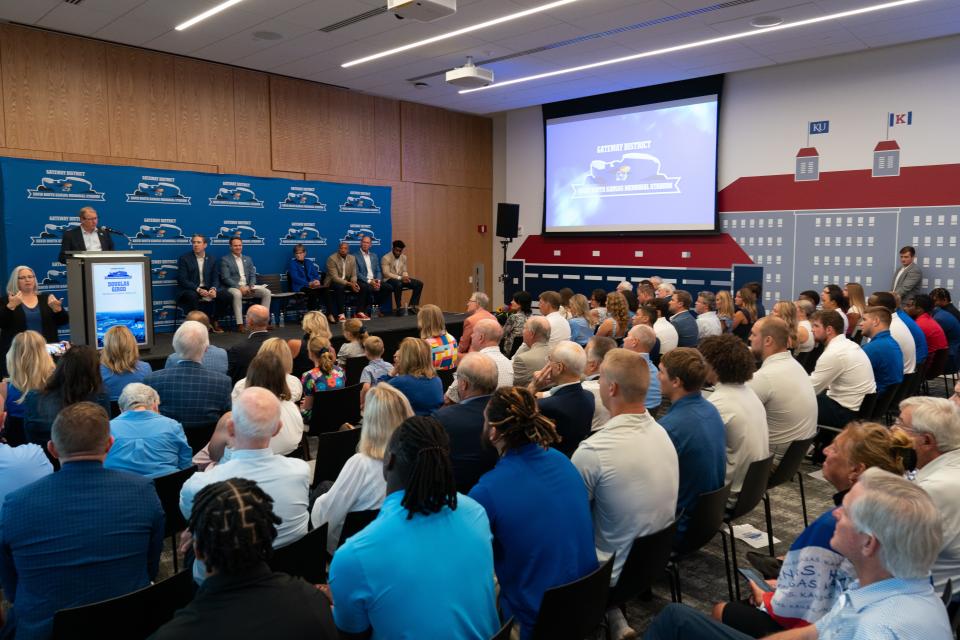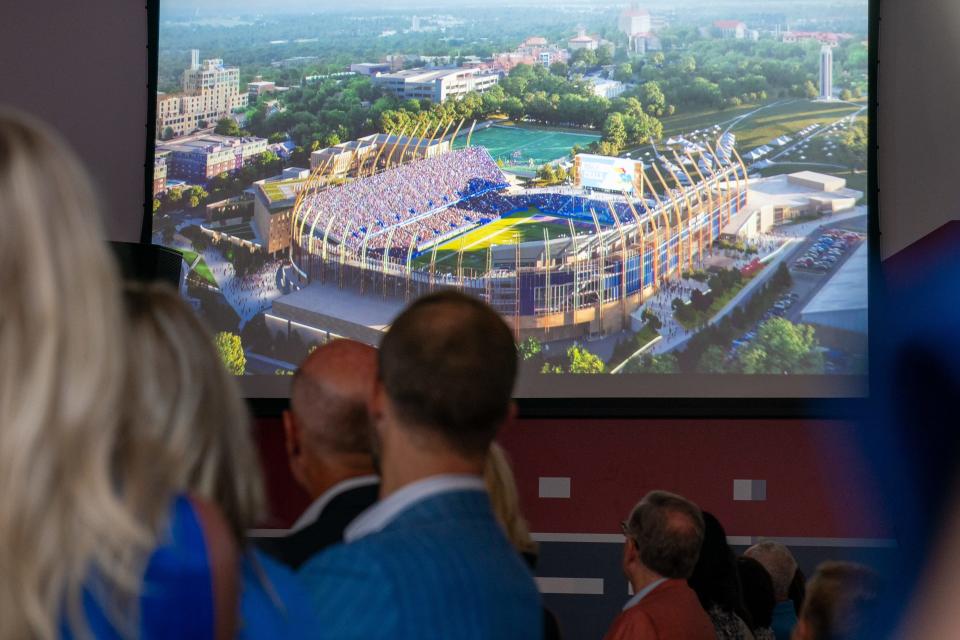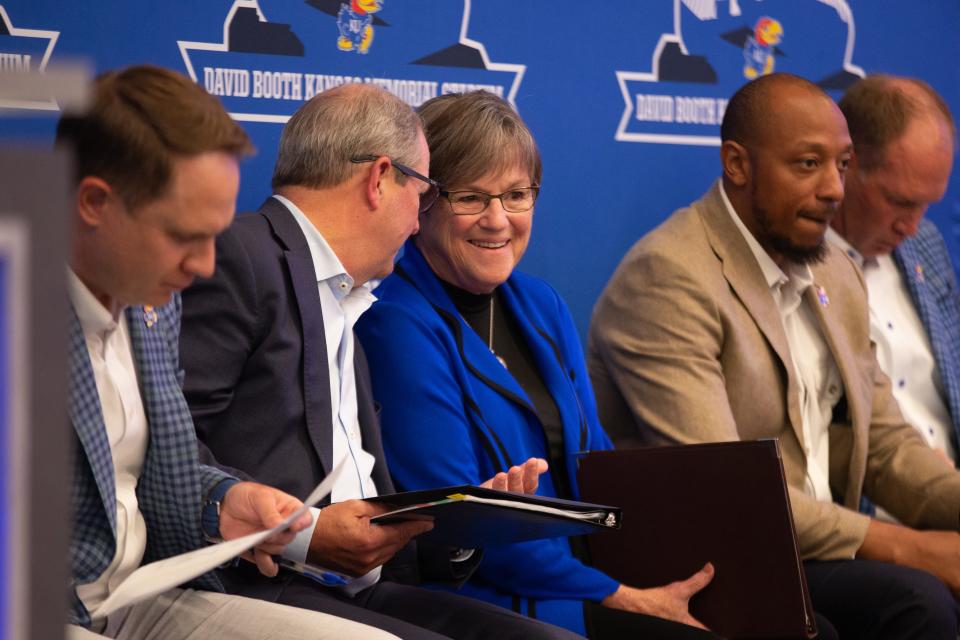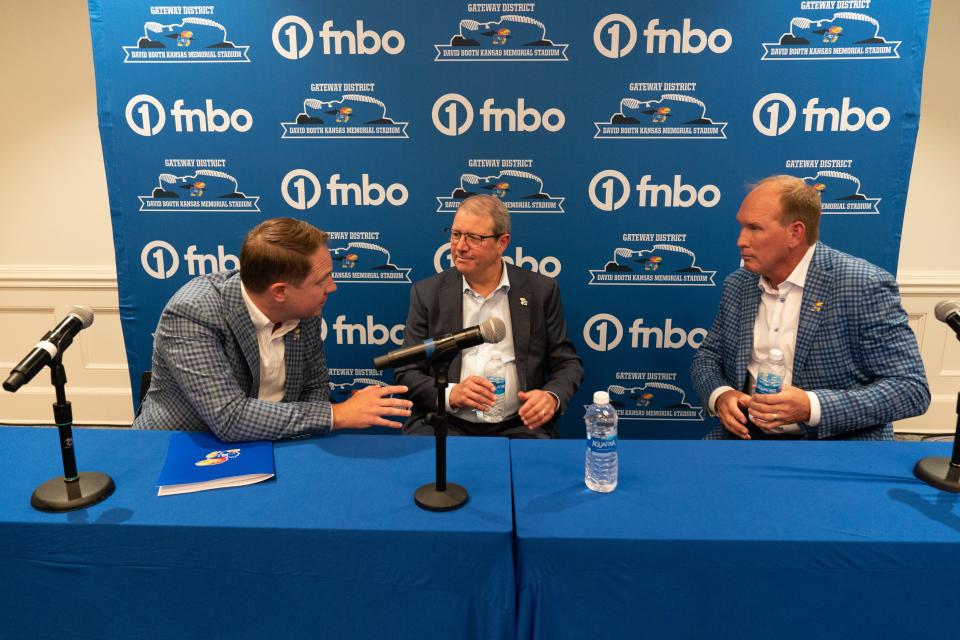KU unveils latest renderings for $300 million renovation to David Booth Memorial Stadium
LAWRENCE — The University of Kansas on Tuesday unveiled ambitious plans and renderings for a more than $300 million renovation of David Booth Kansas Memorial Stadium, part of a larger effort to create a campus gateway and destination for prospective students and out-of-town visitors.
Officials shared renderings for the project, which will be mostly supported by private funds with a mix of federal and state economic development dollars.
"The Gateway District is a once-in-a-generation project to transform our campus and drive economic development throughout the region,” Chancellor Douglas Girod said in a statement. “Specifically, this project will create exciting new amenities for students, employees and visitors while providing Kansas Football the facilities it needs to compete at the highest level."

David Booth Memorial Stadium renovations emphasize improving fan experience
Several years in the making, the University of Kansas has been fundraising for an ambitious project, estimated in the past to be $335 million, to overhaul David Booth Kansas Memorial Stadium and the area around it into a university gateway on the northeastern end of campus.
Work has started on the first phase, which includes renovations to the locker and weight rooms at the Anderson Family Football Complex, a state-of-the-art sports medicine center, a player lounge with nutrition bars and stations, and other student-athlete support facilities.
A glimpse of the KU Gateway District and David Booth Kansas Memorial Stadium 👀
Stay tuned for the full reveal of all the renderings, video, and more coming this afternoon! pic.twitter.com/zIgSYObbvQ— Kansas Jayhawks (@KUAthletics) August 15, 2023
Beyond the player facilities, the goal is to improve the fan experience in and around the stadium, with added accessible seating, improved sightlines and a new seating bowl putting spectators closer to the field.
New chairback seating on the west end will accompany a new video board, which will be approximately 2.5 times larger than the current one. Seats in general will be roomier, with bigger seat areas and 50% more legroom throughout the stadium.
The project will also add about four times more food and drink options, as well as more restrooms.

Next steps in the first phase include construction to begin at the end of the 2023 regular football season on the new southwest, west and north sides of the stadium. That phase is expected to wrap up by fall 2025.
Kansas football stadium renovations are part of bigger effort to create a campus gateway
The project will also add a conference and convention center in that area, meaning the campus gateway area could serve as a hub and incubator of interest for prospective students and out-of-town visitors to Lawrence. Officials estimate that 500,000 prospective students and university guests will visit the gateway district and stadium each year.
Later phases include work on the south and east portions of the stadium and other multi-use facilities that can be used for non-football purposes. Those include amenities to spur economic development, such as arts and entertainment spaces, dining, retail, office spaces and lodging.
"The cumulative impact of a world-class football operations complex and one of the finest game day venues in the country catapults Kansas Football, and our entire athletics program, into this critical next chapter,” KU athletic director Travis Goff said in a statement. “We have a proud history, but this unprecedented investment makes a powerful statement about an even brighter future and provides far-reaching impact for our university community, fans and football program."
Other universities using challenge grant monies for research, academics
The University of Kansas, as well as a few other recipients, had come under criticism since the awarding of the challenge grants.
The challenge grants were awarded to universities by the Kansas Department of Commerce for projects that could boost economic development in their campus communities and increase student enrollment. The requirement was that universities raise at least three times any award amount in private or external funds to support the bulk of the projects.

A couple of other universities focused their share of their challenge grant dollars to non-athletic campus enhancements. Kansas State University is using its $25 million in challenge grant money to create new College of Agriculture facilities for research and academics, while Pittsburg State is using its $12.5 million to create an educational enterprise district in downtown Pittsburg.
More: In taking $50M in state funding, KU says football stadium improvements will help boost enrollment
Fort Hays State University, comparatively, is using $2.4 million in grant money to build a $9.5 million athletic complex next to its football stadium, with some space intended to serve as a training facility for pre-athletic training and pre-physical therapy students.
University of Kansas officials on Tuesday stressed that no tuition or state general funds will be used on the Campus Gateway project. A statement said the university may not use its full $50 million grant, and since its award, the university and its fundraising arm have raised $165 million toward a $300 million donation goal for the stadium project as well as renovations to Allen Fieldhouse. Kansas Athletics may also raise additional funding by issuing bonds, with that debt paid off by any new revenue from the stadium.
KU officials estimate the project will spur $2.4 billion in direct, indirect and induced spending and $1.4 billion in earnings, particularly through the creation of 720 permanent jobs and 670 temporary jobs.
Turner Construction Company was selected as the project's construction manager earlier this month, with nationally renowned but local firms HNTB and Multistudio handling design.
What Lance Leipold is saying about new Kansas football facility plans

Kansas football coach Lance Leipold said the university's investment in the stadium will help the football program keep upward momentum over the next few years.
“This project is vital to the continued growth of our program. We are incredibly appreciative of the commitment shown by our generous donors, Chancellor Girod, Travis Goff and many others,” Leipold said a statement. “The substantial upgrades to David Booth Kansas Memorial Stadium and Anderson Family Football Complex will greatly enhance the student-athlete experience. I am very much looking forward to seeing that come to life.”
Rafael Garcia is an education reporter for the Topeka Capital-Journal. He can be reached at rgarcia@cjonline.com or by phone at 785-289-5325. Follow him on Twitter at @byRafaelGarcia.
This article originally appeared on Topeka Capital-Journal: Kansas football shows plans for $300 million Memorial Stadium project

